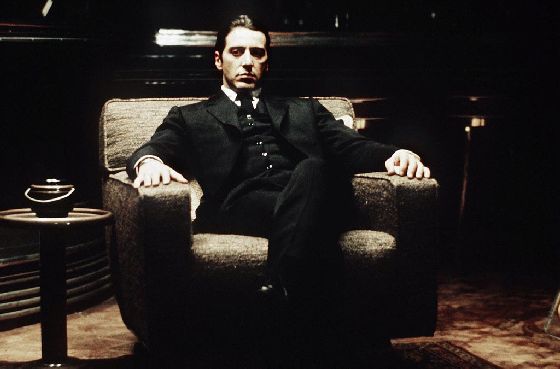The Godfather: Part II (1974) 

Director: Francis Ford Coppola
Cast: Al Pacino, Robert De Niro, Robert Duvall
Synopsis: The early life and career of Vito Corleone in 1920s New York is portrayed while his son, Michael, expands and tightens his grip on his crime syndicate stretching from Lake Tahoe, Nevada to pre-revolution 1958 Cuba.
Beginning at the same moment that the original Godfather movie finished, Francis Ford Coppola’s The Godfather Part II proceeds to compare and contrast the stories of Michael Corleone, heir to the Corleone crime empire, and his father Vito, played in the original by Marlon Brando, but depicted here in his younger years by Robert De Niro. The parallel threads contrast sharply with one another: we see the young Vito, surrounded by a loving family, gaining the respect of the local neighbourhood as he builds a criminal empire based on the granting of favours which are to be unconditionally repaid at some unspecified later date. In the 1950s, however, Michael’s methods of doing business are almost diametrically opposed to those of his father as he operates in an atmosphere of betrayal and mistrust which inexorably isolates him from all those around him.
The film opens with the murder of the family of nine-year-old Vito Corleone (Oreste Baldini). The boy escapes from the village of Corleone and arrives on the shores of New York. As a young man, Vito drifts into a life of crime when his employer, a local grocer, is forced to give Vito’s job to the nephew of the local Black Hand mobster Fanucci (Gaston Moschin) and he befriends neighbour and small-time crook Clemens (Bruno Kirby). It’s not long before Vito, with the aid of his friends Clemenza and Tessio (John Aprea), has replaced Fanucci as the neighbourhood’s crime kingpin and won the trust of the local’s with his benign methods.
In 1958, Michael (Al Pacino) is putting the finishing touches to a deal with crooked Jewish financier Hyman Roth (Lee Strasberg) to pump money into Cuba’s gambling industry in partnership with its government. However, Michael realises Roth is attempting to double-cross him following an attempt on his life. Choosing not to reveal he knows Roth’s intentions (‘Keep your friends close, but your enemies closer’), Michael enlists the aid of disgruntled capo regime Frankie Pentangeli (Michael V. Gazzo) in a plot to get revenge on Roth, but his plan goes awry when Pentangeli is nearly murdered during a meeting with Roth’s partners and turns state’s evidence agains Michael in the mistaken belief that Michael was responsible for the botched hit.
The Godfather Part II really does little more than expand on its predecessors themes of the assimiliation of criminal immigrants into respectable American society, and the corresponding breakdown of the family unit in the face of an ever-expanding regime of crime. Coppola emphasises this corrosive influence by opening the sequel in much the same way he did the first movie – with a large family gathering, this time to celebrate the first communion of Michael’s son, Anthony (James Gounaris). Michael divides his time by holding business meetings as he attends the party in much the same way that Don Vito received visitor’s to his office during his daughter’s wedding celebrations. However, the blinds that separated the family from business in Vito’s office are not in evidence in Michael’s. We see the partygoers over Michael‘s shoulder as he conducts business, suggesting that the barrier between crime and family have been eroded. Similarly, the family ties have loosened, and their Sicilian roots largely forgotten.
While the themes of the sequel don’t really differ from the original, neither does the quality of the screenwriting. With the collaboration once again of the novelist Mario Puzo, Coppola crafts a tightly-plotted tale of Machiavellian intrigue that, for long spells, leaves us unsure about just who is loyal to Michael and who wishes to see him dead, and questioning whether Michael himself knows where people’s loyalties lie. The toll of this life, which is driving he and his wife Kay (Diane Keaton) further and further apart, appears to take an increasing toll on Michael with each passing scene. The burden of responsibility weighs heavily on his shoulders, and he seems to grow increasingly morose with each passing scene. He’s as much a victim of his crimes and of his family’s business as any of his enemies – who are generally despatched with ruthless efficiency – a fact that’s reinforced by a flashback scene near the end of the movie that is both poignant and tragic as we briefly see Michael with ideals still intact before the life claimed him. Pacino, of course, gives a career best, only occasionally allowing us to witness the fearsome anger that bubbles beneath his deceptively calm demeanour.
Equally impressive is acting guru Lee Strasberg as the crooked financier Hyman Roth, another man with a deceptively benign demeanour. Small and slight, he has the sweet, vaguely distracted smile of a favourite grandfather who’s perhaps strayed near to the borders of senility. It’s a disguise that he only once lets drop – when he resurrects the ’business, not personal’ mantra that ran through the first movie while describing his response to the assassination of Moe Greene, a scene depicted in The Godfather. Unlike Michael’s, Roth’s rage is a cold and controlled one, and Strasberg’s playing of it is truly chilling.
The dark look of The Godfather Part II matches its tone and is consistent with that of the first movie, thanks largely to the glossy skills of cinematographer Gordon Willis and production designer Dean Tavoularis. In fact, every aspect of The Godfather Part II is equal to the standards set by it’s illustrious predecessor, and in many instances actually surpasses them. Not to be missed.
(Reviewed 17th August 2012)
httpv://www.youtube.com/watch?v=3KD8c5MHrn4
